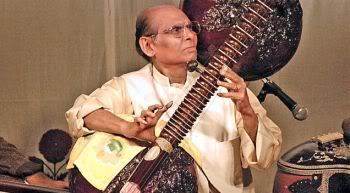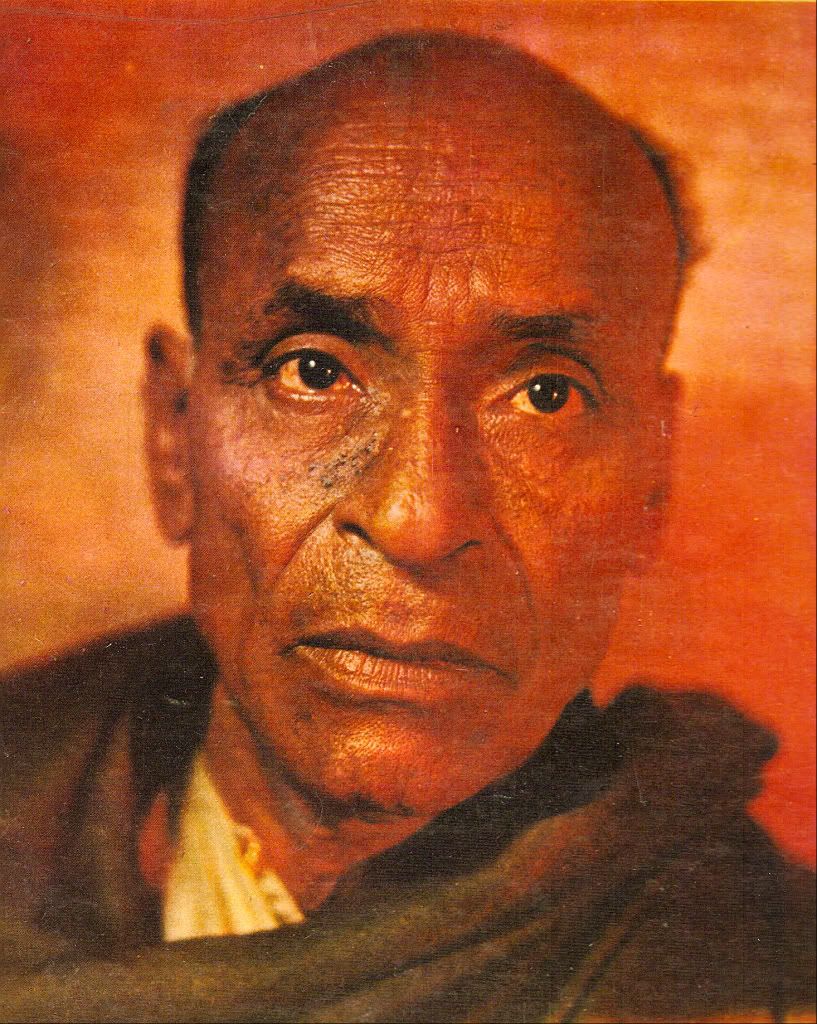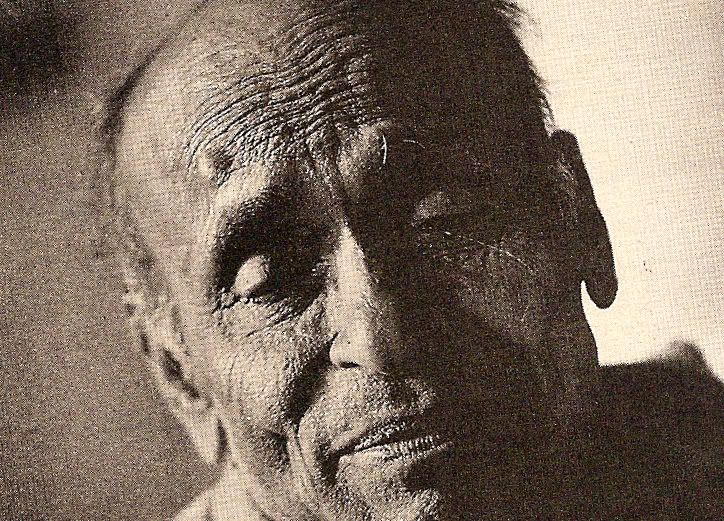India Indian music music: genius Hindustani instrumentalists Raga
by Warren
leave a comment
Meta
SiteMeter
Brighter Planet
78 rpm Records of Indian Music: Abdul Aziz Khan
I’m gradually getting more of my collection of Hindustani 78 rpm records digitized and uploaded.
Here are two performances by the vichitra veena player Abdul Aziz Khan, of the ragas Darbari Kanada and Bageshri.
On both recordings the Ustad can be heard giving himself daad when he plays something nice. It’s a fascinating look at the artist’s mind in its relation to the listeners; he needed to have rasikas enjoying his music for it to have any meaning — and since it was just him and the tabla player in the room, he provided his own feedback as needed.
More to come. I have hundreds of these recordings and I plan on getting them all uploaded in the next year or so.
Indian music music vocalists: genius khyal
by Warren
3 comments
Meta
SiteMeter
Brighter Planet
Faiyaaz Khan: Aftaab-e-Mausiqi
Raga Darbari Kanada
==========================================
Ustad Faiyaz Khan is so far the best known exponent of Agra Gharana in Hindustani classical music. He was the master khayal vocalist of his time. Born at Sikandara near Agra in 1886 (contested as 1888, 1889)[1], he was the son of Shabr Hussain, who died three months before his birth. He was brought up by his maternal grandfather, Ghulam Abbas (1825?-1934), who taught him music, up to the age of 25. He was also a student of Ustad Mehboob Khan Darspiya, his father-in-law and was a for short time a disciple of Ustad Jagadguru Mallick of Calcutta who had the famous sarodiya Ustad Hafiz Ali Khan and the renowned sitarist Ustad Enayet Khan in his tutelege.
WIKI
An extraordinary performance of Raga Desh.
==========================================
The vocalist and historian Susheela Misra writes:
Faiyaz Khan’s musical lineage goes back to Tansen himself. His family is traced back to Alakhdas, Malukdas and then to Haji Sujan Khan (son of Alakhdas who became a Muslim.) Genius, musical ancestary, and training combined to give us this wonderful artist-one of the most reputed and respected exponents of Hindustani classical music in recent times. He had the exceptional good fortune of receiving his talim in Dhrupad singing from his grand father, Ghulam Abbas Khan; and in Dhamar from his grand uncle, Ustad Kallan Khan, both of whom were leading musicians of the rangila gharana in the second half of the last century. Kallan Khan was the younger brother of Ghulam Abbas Khan and, therefore, the grand-uncle of Faiyaz Khan Sahib. Ghulam Abbas Khan was his maternal grandfather, and Rangeela Ramzan Khan his paternal great grandfather. Faiyaz Khan’s uncle, Fida Hussain was a court musician in Tonk (Rajputana). Faiyaz was born at Sikandra near Agra in 1880 and he died in Baroda on 5th November 1950. As his father Safdar Hussain died very early, his grandfather adopted him and brought him up as his own son. Ghulam Abbas Khan, the son of the great Ghagge Khuda Bux and an intimate friend of Bairam Khan, not only imparted to the boy the authentic taleem of his gharana, but also took the promising young Faiyaz on a “pilgrimage of music”, visiting all the important centres of music, listening to great contemporary musicians, and bringing him practical experience in concert singing. By the time he was 18, Faiyaz Khan had become such a “polished” artist that he began to give recitals in places like Bombay, Calcutta and Gwalior. Once at Bombay, 24 year-old Faiyaz got a chance to hear the great Miyanjan Khan, a pupil of the great Fateh Ali Khan of Patiala. Immediately after him, Faiyaz was asked to sing. At first he copied Miyanjan Khan’s Multani in the latter’s style and then he demonstrated in his own style-both in such a masterly way that Miyanjan Khan embraced the young singer and exclaimed in genuine appreciation: “Tum hi ustad ho” (you are a true descendant of the masters of the art.) It was an age of gentlemen-musicians. Link
==========================================
The canonical chiz in Raga Chhayanat, Jhanana jhanana.
==========================================
While people used to admire his flawless diction in Urdu, Hindi, etc, they used to be amazed at his graceful and fine pronunciation of Braj-Bhasha in which a large number of Khayals, Dhamars, etc, are couched. This was because Faiyaz Khan spent his early years in the Braj-Bhasha areas like Mathura, Agra, Atrauli, etc. His father-in-law, Mahboob Khan of Atrauli, was none other than the reputed composer Daras Piya whose khayals in ragas like. Jog, Anandi, etc, are still so popular. Another relation–Suras Piya- was a wellknown composer who lived a recluse’s life in Mathura.
The song Man Mohan Brij ko Rasiya (in Paraj) which Faiyaz Khan has made famous, is a sample of Saras Piya’s compositions. Faiyaz Khan himself composed many songs under the penname Prem Piya.
In his youthful “halcyon days” Faiyaz Khan sat in the company of great artists like Moizzuddin, Bhaiya Ganapatrao and Malkajan. That was how he had imbibed the romantic Thumri style and could render Dadras and Ghazals so imaginatively. Many a time I have witnessed Faiyaz Khan rendering the Bhairavi Thumri “Babul Mora” and drawing tears out of the listeners’ eyes. Faiyaz Khan used to say that Malkajan’s Bhairavi-Thumris were peerless. And Malka even in her obscure later years never missed the Ustad’s concerts in Calcutta. Unlike some highbrow musicians, Faiyaz Khan never looked down on light classical types of songs. He used to say:- “It is not a child’s play to sing a Thumri or a Ghazal. The essence is the bol-but one has to be very imaginative and original.” Even into a simple Dadra he could pour a lot of genuine emotion. Link
==========================================
Another “Payal baaje” bandish, this time the classic in Nat Bihag.
==========================================
Ramkali: Un sanga laagi ankhiyan. His layakari is very enjoyable.
Ustad Faiyaz Khan would render a full scale ‘Nom-Tom’ alap and follow it up with khayal compositions, thus blending dhrupad and khayal and giving his gayaki more flexibility. His bol-banawo, bant, layakari, and his inimitable style of reaching the sam are unmatched even today. He was a great composer himself, his pen name being #145;Prempiya’. His compositions in raga Jaijaiwanti, Jog etc. are treasured by Agra singers to this day. In fact, Faiyaz Khan’s Agra gayaki became so famous that most of his students and followers would actually copy him to the very last detail, imitating even his voice.
Baju band khul khul jaaye in Raga Bhairavi. One of the pivotal renderings of a timeless classic. Enjoy his layakari and occasional tappa-ang taans in the laggi section.
Another Bhairavi, Banao batiyaan. This wonderful dadra performance is packed with emotion. Note his heartfelt pukaras as he approaches the top Shadja; nobody can evoke emotion like this anymore, alas. Also notice his inclusion of vernacular, “speechy” utterances like “Aare haan” (“Oh, yeah!”) in the course of his rendering, rather like a contemporary bluesman.
Jazz music vocalists: genius Great American Songbook
by Warren
leave a comment
Meta
SiteMeter
Brighter Planet
Hoagy Carmichael
The composer of countless wonderful songs was also a charmingly relaxed performer of his own music. In the second half of his career he was often given cameo roles in movies, performing one or another of his contributions to the Great American Songbook.
—————————————————
Lazy Bones
==========================================
Hoagland Howard “Hoagy” Carmichael (November 22, 1899 – December 27, 1981) was an American composer, pianist, singer, actor, and bandleader. He is best known for writing “Stardust”, “Georgia On My Mind”, “The Nearness of You”, and “Heart and Soul”, four of the most-recorded American songs of all time.[1]
Alec Wilder, in his study of the American popular song, concluded that Hoagy Carmichael was the “most talented, inventive, sophisticated and jazz-oriented” of the hundreds of writers composing pop songs in the first half of the 20th century.
WIKI
==========================================
Am I Blue
==========================================
He was born Hoagland Howard Carmichael in Bloomington, Indiana on November 22, 1899. His father was an electrician and his mother played the piano for dances and silent films. Although his ambition was to become a lawyer, Carmichael showed an early interest in music. When his family moved to Indianapolis in 1916, he took lessons from an African-American pianist Reginald DuValle. He attended Indiana University, and, while there, he organized his own jazz band. When the great jazz cornetist Bix Beiderbecke, then at the very beginning of his brief career, paid a visit to Indiana University in the spring of 1924, he and Carmichael quickly became friends, and it was for Beiderbecke that Carmichael wrote his first piece. Not long afterward, Beiderbecke and the Wolverines recorded it under the title “Riverboat Shuffle”.
Carmichael went on to the Indiana University Law School, and continued to perform and write music while there. He graduated in 1926, and began to practice law in West Palm Beach, Florida. However, the discovery that another of his early tunes “Washboard Blues” had been recorded prompted him to abandon law for music. He briefly returned to Indiana, and then in 1929 he arrived in New York. He resumed his contact with Beiderbecke and was introduced with some of the most talented young musicians of the day, including Louis Armstrong, the Dorsey Brothers, Benny Goodman, and Jack Teagarden. Another important lifelong friendship during this time was also established with lyricist Johnny Mercer. Link
==========================================
Playing “Stardust” — next up is Hoagy’s vocal version from 1942:
Hoagy’s whistling is great.
==========================================
Here’s a discography of some of Hoagy’s own recordings.
==========================================
Lazy River, from 1930.
==========================================
Old Buttermilk Sky. In last year’s “Singing For The Planet” concert, Dominique Eade performed a beautiful version of this song.
==========================================
“Old Rockin’ Chair,” a song originally written for Mildred Bailey. Recorded in 1956 with the Pacific Jazz All Stars.
==========================================
Carmichael was a Republican supporter and FDR hater, voting for Wendell Wilkie for president in 1940, and was often aghast at the left-leaning political views of his friends in Hollywood.
WIKI
Nobody’s perfect.
Education India Indian music music Personal: aesthetics Education genius India Indian music music obituary
by Warren
2 comments
Meta
SiteMeter
Brighter Planet
A Great Tree Has Fallen: Asad Ali Khan, R.I.P.
This Tuesday, June 14, the world of music lost a great spirit.
Ustad Asad Ali Khan, one of the few remaining performers on the ancient Indian stringed instrument called the Rudra Veena, passed away after suffering a heart attack in the early hours of the morning.

He performed an austere and sober style of music, an instrumental version of the vocal style known as Dhrupad, which dates back to the 11th century or so. The Rudra Veena, or Been, is considered to be one of the oldest instruments of Indian tradition; it has its own origin myth, which states that the instrument sprang full-blown from the forehead of a meditating Lord Shiva. It is interesting that Asad Ali Khan, whose name makes his Muslim ancestry evident, saw no religious conflict in embracing this story; ecumenicism in Indian musical traditions is alive and well.
India Indian music music vocalists: genius khyal
by Warren
2 comments
Meta
SiteMeter
Brighter Planet
Mallikarjunbua Before Jaipur-Atrauli Training
Here are some more of the 78 prm discs from Mallikarjun Mansur’s early period, when he was still singing Gwalior gayaki. These recordings are utterly delightful.
Gaud Malhar:
Jaunpuri:
Kafi:
Adana:
music vocalists: beauty genius joy reasons to carry on
by Warren
leave a comment
Meta
SiteMeter
Brighter Planet
Thomas Quasthoff and the Alchemy of Song
As a singer and a singing teacher, I have spent decades listening to voices. Voices meek, voices strong. Voices constricted by fear and insecurity, voices filled with exaltation, voices once robust but now vitiated by age or illness. While I’m not an expert on vocal anatomy, I can understand what’s going on inside the voices of anyone I hear.
I’ve listened to more different types of vocal music than most people know exist. Quiz me sometime and I’ll tell you about Sardinian quartets, about Tuvan throat-singing, about Ainu bear ceremonies. I’ve been knocked out by greatness in more genres than you can shake a stick at. I’ve heard vocal geniuses at close range and at a distance.
And today I’d like to tell you about one of them. This guy:

India Indian music music vocalists: genius Jaipur Gharana khyal
by Warren
9 comments
Meta
SiteMeter
Brighter Planet
Singing Is Nothing But Joy: An Appreciation of Mallikarjun Mansur

The first time I heard the music of Pandit Mallikarjun Mansur was in 1978, very early in my study of Hindustani music. I’d taken a survey course on Indian music at the Harvard Extension, and the professor gave me an assortment of vocal music that included Mansur’s rendition of a beautiful rainy-season raga, Gaud Malhar.
It was strikingly different from the other music on the tape. More than any of the other singers represented, this vocalist really seemed to be enjoying himself. There was a rhythmic playfulness that spoke to my jazz-loving self, integrated with the serene aesthetic flow that characterizes Hindustani music. His voice was a high, slightly raspy tenor; his range was relatively narrow; his breath control preternatural.
I asked other people about Mansur. This was the late 1970s, and most of the people I knew in the Indian music community had never heard of him; as it turns out, he had not been performing widely for decades and had only recently returned to the notice of the concertgoing public in India. Over the next few years I gradually acquired tape recordings of his LP records, whetting my appetite for more of this remarkable singer’s remarkable music. Nobody I knew on the Indian tape-trading network had any concert recordings, and the Internets hadn’t been invented yet.

India Indian music music vocalists: genius Kirana gharana
by Warren
4 comments
Meta
SiteMeter
Brighter Planet
Sureshbabu Mane
This recording of the Bhairavi thumri “Baju band khul khul jaa” is really exquisite. Sureshbabu’s vocal quality is very much like that of his father Abdul Karim Khan, but there is a relaxed sweetness that is unique.
Sureshbabu Mane (1902 – 1953) was a prominent Hindustāni classical music singer of Kirānā Gharānā in India.
Sureshbabu was born as Abdul Rehmān to Kirana Gharana master Ustād Abdul Karim Khān and Tārābāi Māne. Tarabai was the daughter of Sardār Māruti Rāo Māne, a brother of princely Barodā state’s “Rajmātā” during the middle of the 19th century. Abdul Karim Khan was the court musician in Baroda when Tarabai was young, and he taught her music. The two fell in love and decided to get married; but Tarabai’s parents disapproved of the alliance, and the couple had to leave the state (along with Abdul Karim’s brother, Ustād Abdul Haq Khān). The couple moved to Bombay (Mumbai), and had two sons: Suresh or Abdul Rehmān, and Krishnā; and three daughters: Champākali, Gulāb, and Sakinā or Chhotutāi. In their adult lives, the five respectively became known as Sureshbābu Māne, Krishnarāo Māne, Hirābāi Badodekar, Kamalābāi Badodekar, and Sarswatibāi Rāne.
His pronunciation is very soft, a characteristic of many Kirana style singers who embodied the notion that clear articulation of the words detracted from qualities of intonation. This is a highly vowel-oriented style!
Sureshbabu was an avocational alchemist, a tragic hobby that may have contributed to his early death through exposure to toxic chemicals. It’s trite but accurate to remark that his real alchemy was in the realm of musical expression; I have rarely heard such a haunting version of this thumri.
I used to visit Hirabai Barodekar’s house in Pune fairly often when I was living there. She was a very old lady at the time; I sang for her once just after I’d arrived and she was kind and polite in her responses. Her grandson Nishikant Barodekar was on his way to becoming a very well-regarded tabliya.
Jazz music vocalists: genius
by Warren
leave a comment
Meta
SiteMeter
Brighter Planet
The Man Who Made James Moody “James Moody”
Here’s a little classic from King Pleasure:
India Indian music music: agra gharana genius khyal
by Warren
leave a comment
Meta
SiteMeter
Brighter Planet
Dinkar Kaikini
Performing Raga Komal Re Asavari, with Sheikh Dawood Khan on tabla:
I enjoy his singing so much. The raspy and expressive voice always carries me along on the surging flow of imagination.
